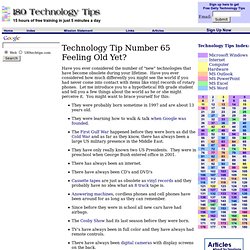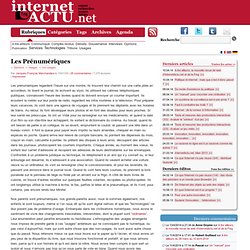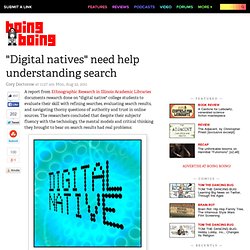

Story maker. The technology generation gap - 180 Free Technology Tip #65. Technology Tip Number 65 Feeling Old Yet?

Have you ever considered the number of "new" technologies that have become obsolete during your lifetime. Have you ever considered how much differently you might see the world if you had never come into contact with items like vinyl records of rotary phones. Let me introduce you to a hypothetical 8th grade student and tell you a few things about the world as he or she might perceive it. You might want to brace yourself for this: They were probably born sometime in 1997 and are about 13 years old. Keep in mind that this is just a partial list. If you'd like to read more on this topic consider the following websites: Beloit College releases an annual "Mindsets List" to help their faculty better understand incoming freshman.
Often times as adults we forget about the physical toll the use of technology takes on children. Featured YouTube Video: Understanding the Digital Generation - Ian Jukes Have a nice day! Les Prénumériques. Les prénumériques regardent l’heure sur une montre, ils trouvent leur chemin sur une carte pliée en accordéon, ils lisent le journal, ils écrivent au stylo.

Ils utilisent les cabines téléphoniques publiques, connaissent l’heure des levées quand ils doivent envoyer un courrier important. Ils écoutent la météo sur leur poste de radio, regardent les infos routières à la télévision. Pour préparer leurs vacances, ils vont dans une agence de voyages et ils prennent les dépliants avec les horaires de trains. Au retour, ils font développer leurs photos et en font des doubles pour leurs proches.
Si leur santé les préoccupe, ils ont un Vidal pour se renseigner sur les médicaments, et quand la date d’un film ou son rôle-titre leur échappent, ils sortent le dictionnaire du cinéma. On est toujours le prénumérique de quelqu’un. Pourtant nous ne vivons pas un basculement intégral : certaines substitutions sont lentes, d’autres n’auront pas lieu. Jacques-François Marchandise. Are We Wired for Mobile Learning? - Social Learning Blog. Hybrid Learning: How to Reach Digital Natives by Alan Rudi. “Hybrid education offers promise for engaging students who are demotivated by the lack of meaningful use of technology, and associated opportunities for skill-building and efficiency, in many lessons today.”

As technology continues to advance and become more accessible around the world, experts who study how children learn are developing fresh paradigms designed to reach the new generation of students dubbed “digital natives.” The term emerged in 2001 from the work of Mark Prensky, a thought leader, speaker, writer, consultant, and game designer in the field of education and learning. Prensky is also an outspoken advocate of forming a more relevant system for teaching our children. According to Prensky, digital natives are the young people growing up in the digital world.
They cut their teeth on tech gadgets, smart phones, and the Internet and can’t conceive of a life without technology. Technology has transformed the world around us. Purpose-driven learning -- Editor return to top. Digital Native Myth. “Digital natives” need help understanding search. A report from Ethnographic Research in Illinois Academic Libraries documents research done on "digital native" college students to evaluate their skill with refining searches, evaluating search results, and navigating thorny questions of authority and trust in online sources.

The researchers concluded that despite their subjects' fluency with the technology, the mental models and critical thinking they brought to bear on search results had real problems: The prevalence of Google in student research is well-documented, but the Illinois researchers found something they did not expect: students were not very good at using Google. They were basically clueless about the logic underlying how the search engine organizes and displays its results. Consequently, the students did not know how to build a search that would return good sources.
(For instance, limiting a search to news articles, or querying specific databases such as Google Book Search or Google Scholar.)